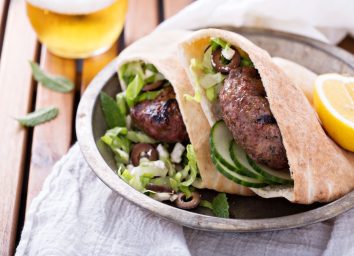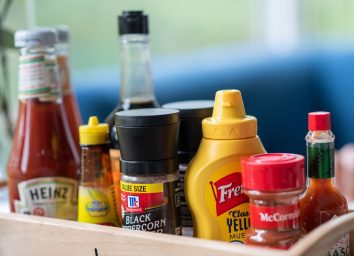8 Popular "Burger" Options—Ranked!
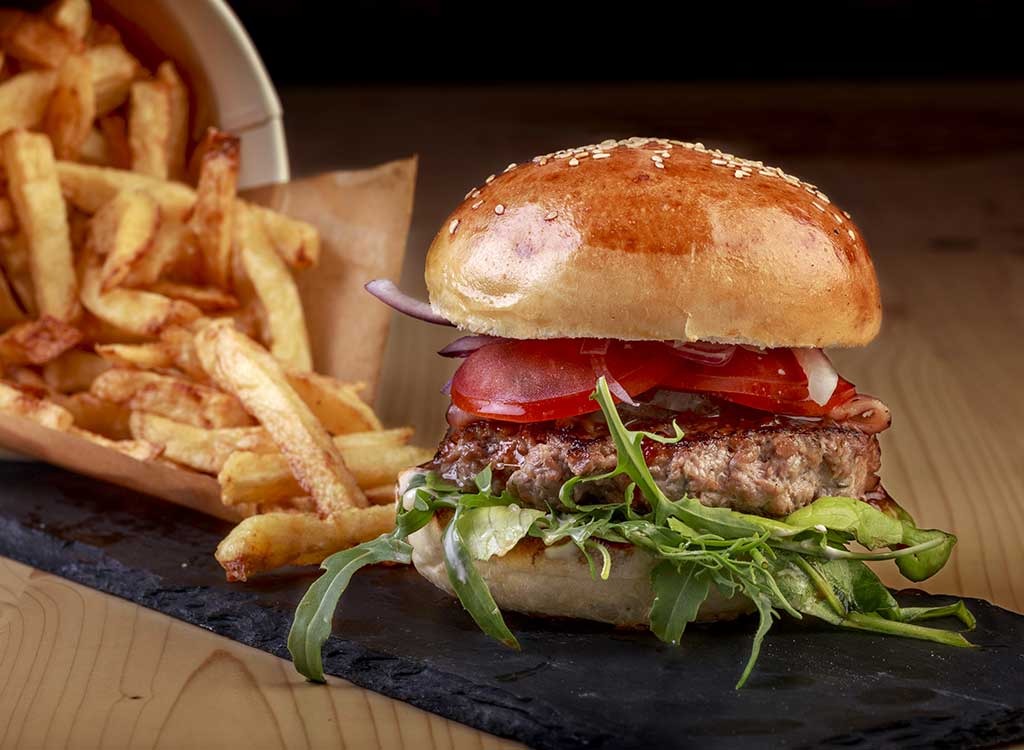
In its purest form, a burger is a patty sandwiched between a bun and topped with condiments. When they're on their best behavior, those patties are gingerly placed between a whole-grain bun (or a makeshift lettuce bun) and generously topped with veggies like tomatoes and onions. But when burgers behave badly, they're dripping in grease and gussied up with caloric extras like bacon and mayo. (Can you blame us for throwing major shade at the worst food in the world, the Reeses' Peanut Butter Cup-stuffed burger?! Oof.)
Our point: Burgers can be as healthy as you're willing to make them, especially when you're open to re-imagining the patties and their supporting cast of buns and condiments. But in general, we know that even a basic order can make you wonder which one to choose, which is why we've ranked your best burger options. In stacking these up, we have certainly taken into consideration just how likely you are to bury them in high-calorie extras. Be warned, though, that we can't guarantee a veggie burger from a fast food joint will be better for you than a grass-fed beef burger at a gourmet restaurant; but if all things were equal and you're only looking at the menu at one establishment, this list is a good place to start in terms of your healthiest options. To get specific about burgers from your favorite restaurants, don't miss our report on the 40 Popular Burgers—Ranked!
From Worst to Best…
Beef Burgers

A traditional ground beef burger can be a good, high-protein meal—especially if it's grass-finished beef, which we'll tell you more about in a second. Beef is one of the best sources of B12, a vitamin essential to the production of red blood cells and energy. And even though it's ranked the worst, that's largely because of how often beef burgers get totally ruined—it's hard to find burgers that don't have descriptors like "double patty," "onion shoestrings," and "crispy bacon."
One way to make sure your beef burger cravings are satisfied in the most wholesome way possible is to go for grass-finished, not just grass-fed. Yes, it will cost you a little bit more (and that's on top of choosing grass- instead of grain-fed) but is worth it because it's naturally leaner. "So many people pay a premium for grass-fed, but what they don't realize is the animal is usually fed corn and soy for the last two months—and it can be GMO to boot," says certified nutritionist Nancy Guberti. "Grass-finished means the animal never had any grain." Making your own burgers at home? Good! Here are 20 Tips for How to Make the Perfect Burger.
Elk Burgers
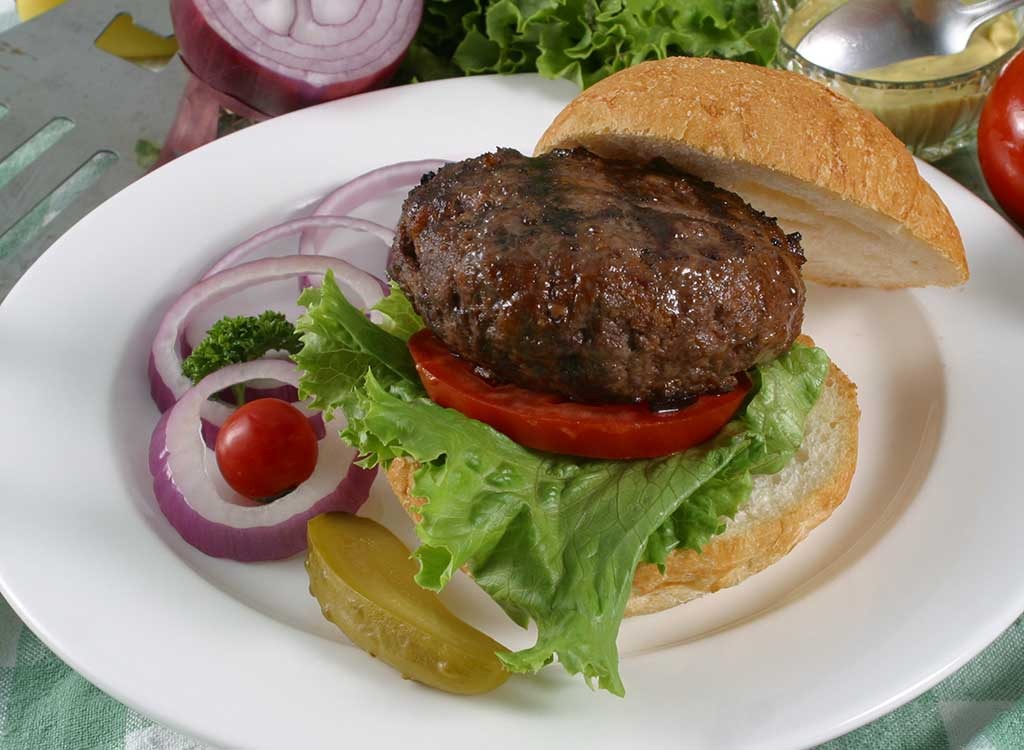
Elk burger > beef burger. And here's why: An elk burger not only has more protein than traditional ground beef, but it's also significantly lower in fat. If you're chowing down on a 3-ounce burger (you might want to cut your burger in half to keep your portions in check), an elk burger has about 133 calories and 2 grams of fat compared to 182 calories and 9 grams of fat in a beef burger. The lean meat is also tender and high in B12 vitamins and iron, like other meats.
Portobello Mushroom Burgers
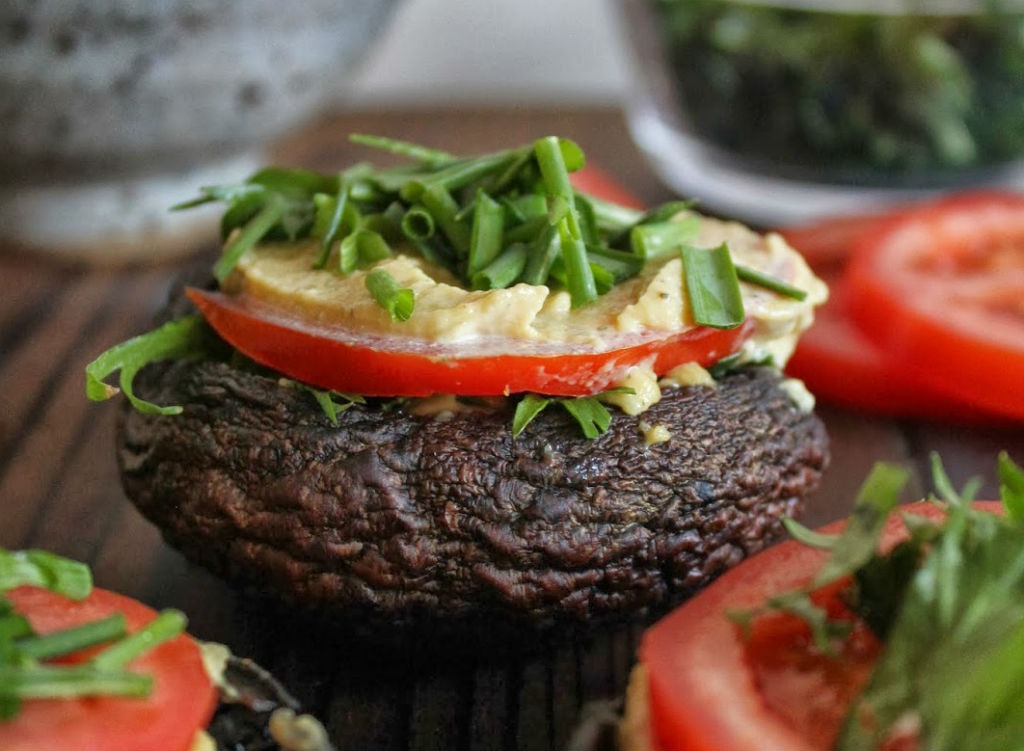
You might be pleasantly surprised by the meaty texture of a portobello mushroom burger. Plus, they have a robust, umami flavor. (Translation: You don't have to douse it in condiments to trick yourself into thinking you're enjoying a burger.) But along with allowing you to partake in Meatless Mondays, the polyphenols in mushrooms also elevate them to superstar status. A Penn State study found that portobello and crimini mushrooms rank with carrots, green beans, red peppers, and broccoli as stellar sources of dietary antioxidants.
One hold-up, though: Many portobello mushroom burger recipes and menu options include a heap of melted cheese. And while mozzarella may still be lower in fat than all those blue cheese crumbles on a bacon burger or the thick slices of cheddar layered in a cheeseburger, cheese can still be a calorie trap. We vote that you ditch the cheese altogether on your mushroom burger.
Turkey Burgers
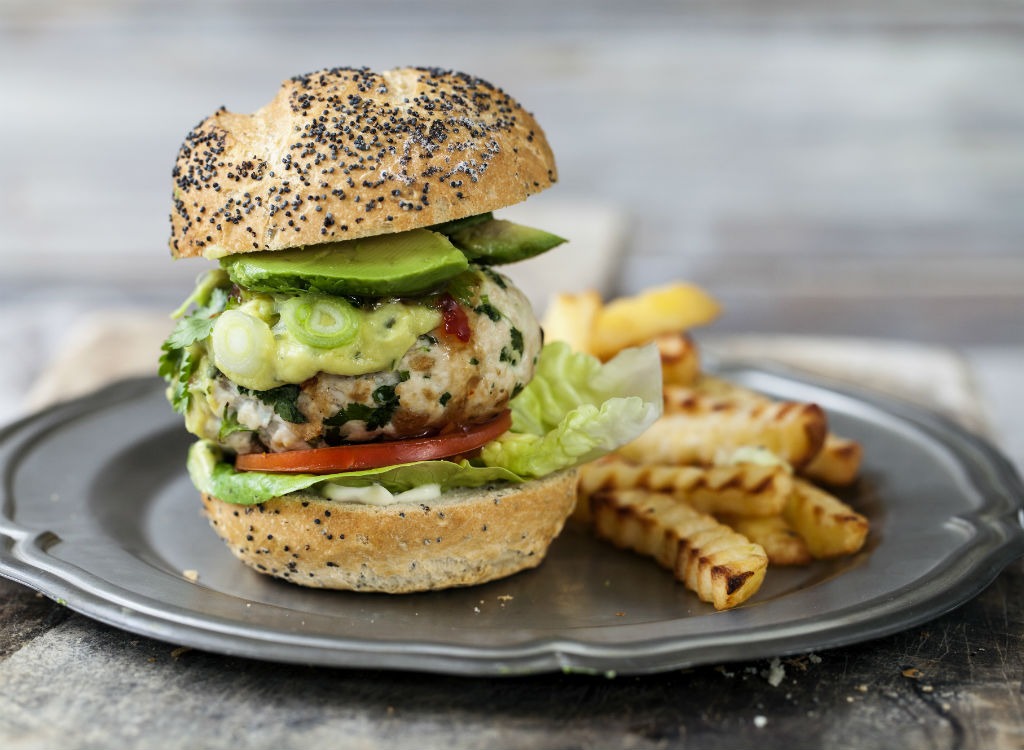
Consider a turkey burger a stunt double for your ground beef patty. "If you choose a turkey burger made from ground breast meat, it will be ultra-lean, low in calories, and low in artery-clogging fat," say the Nutrition Twins, Lyssie Lakatos, RDN, CDN, CFT and Tammy Lakatos Shames, RDN, CDN, CFT, authors of The Nutrition Twins' Veggie Cure. "If you don't choose a turkey burger made from breast meat, you may be better off choosing a traditional burger because many turkey burgers include all parts of the bird—including the fatty skin ground—and contain as many calories and as much artery-clogging fat as a regular burger," The Nutrition Twins say. Otherwise, when made with breast meat, they give turkey burgers a stamp of approval for being a great lean source of protein.
A great way to keep your turkey burger healthy and on target with your body goals is to eat it with only half a whole-grain bun or put the turkey burger on a bed of lettuce and tomatoes. Regardless, the Nutrition Twins recommend adding lettuce or tomato for the extra nutrients and fiber; plus, the vitamin C in the tomato enhances the absorption of the iron in the turkey. Find out more about The Best Iron Rich Foods—And Why You Need Them, too!
Veggie Burgers
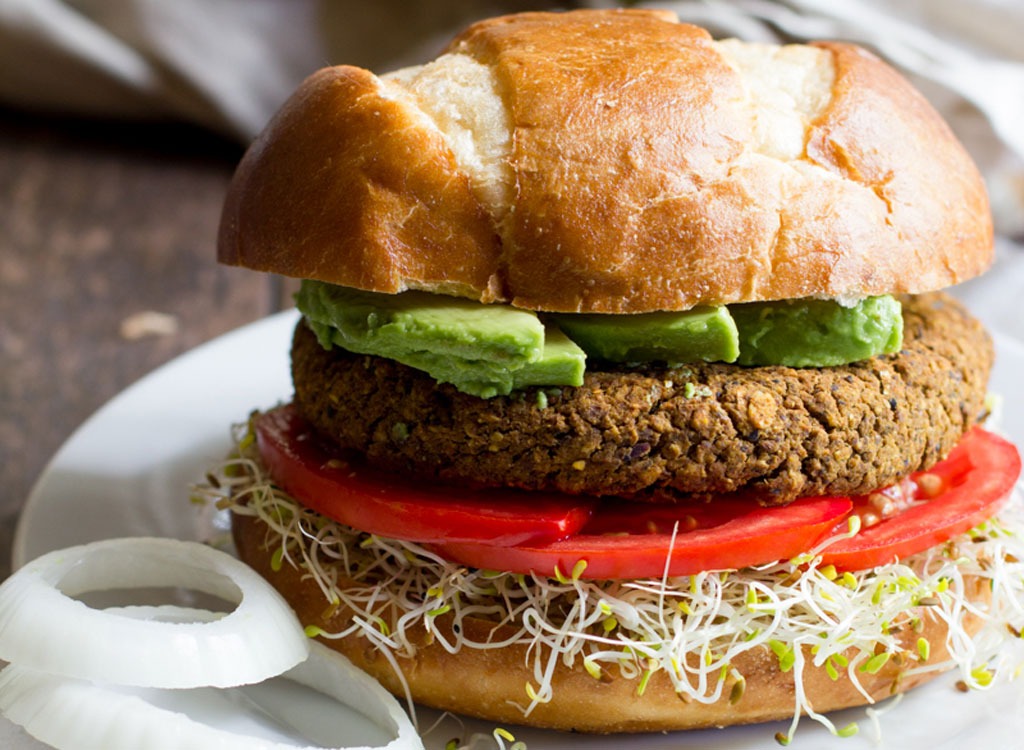
Ah, veggie burgers—some really slay while others are just cray. "Traditional veggie burgers are typically satisfying and a great way to slash artery-clogging saturated fat when used to replace hamburgers," the Nutrition Twins advise. Plus, using veggie burgers reduces exposure to heterocyclic amines, the carcinogens created when meat is heated on the grill at high temperatures.
Veggie burgers aren't the leading ladies on our list, though, because some of them are just as high in calories as traditional burgers. Also, some of the pre-made ones are rather large and contain a lot of oil, too. On top of all that, some store-bought veggie burgers are packed with sodium, the Nutrition Twins explain.
Meanwhile, some are made with soy and others are stuffed with legumes. To make it easier for you, here are the 32 Best and Worst Veggie Burgers, as analyzed by the Eat This, Not That! research team.
Bison Burgers
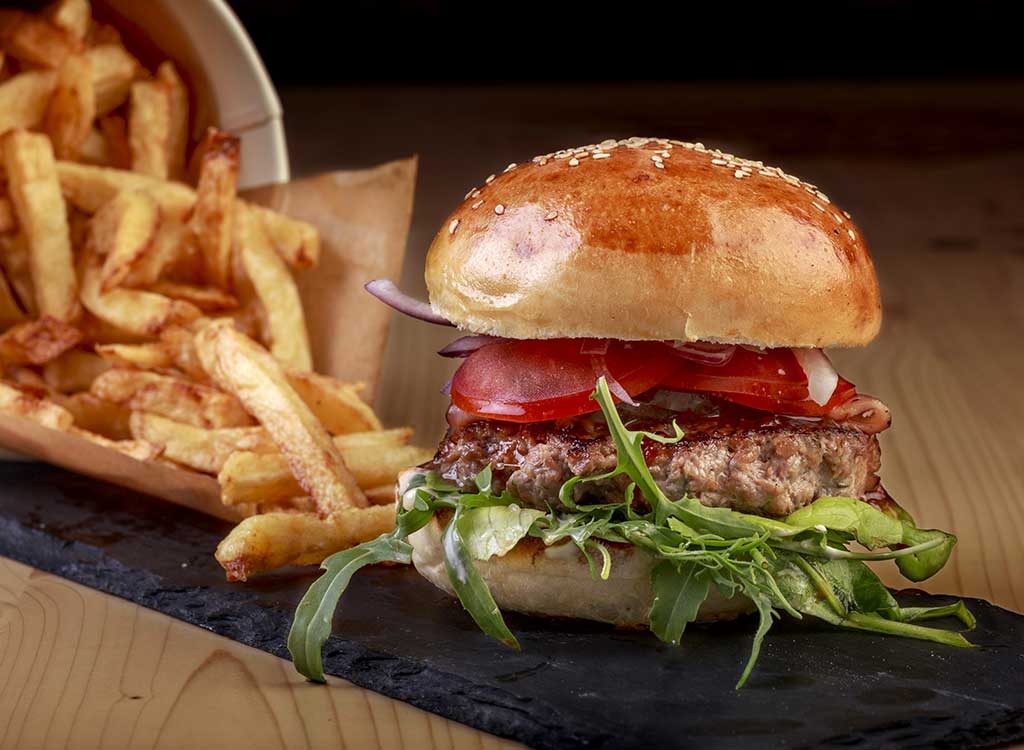
Flavor-wise, bison is just about as close as you can get to beef. It's tender and even a bit sweet. But its nutritional profile makes it a much healthier option than a par-for-the-course ground beef burger. A 90% lean hamburger has about 10 grams of fat, according to the USDA. But a bison burger (AKA buffalo burger), by comparison, has 2 grams of fat and 24 grams of protein—making it a lean, mean protein! Even though it's not plant-based, bison earned its rank higher up on the list because you can truly satisfy your burger craving with a healthy doppelgänger…and your chances of sabotaging with unhealthy condiments to try to make it taste great are lower.
Wild Salmon Burgers
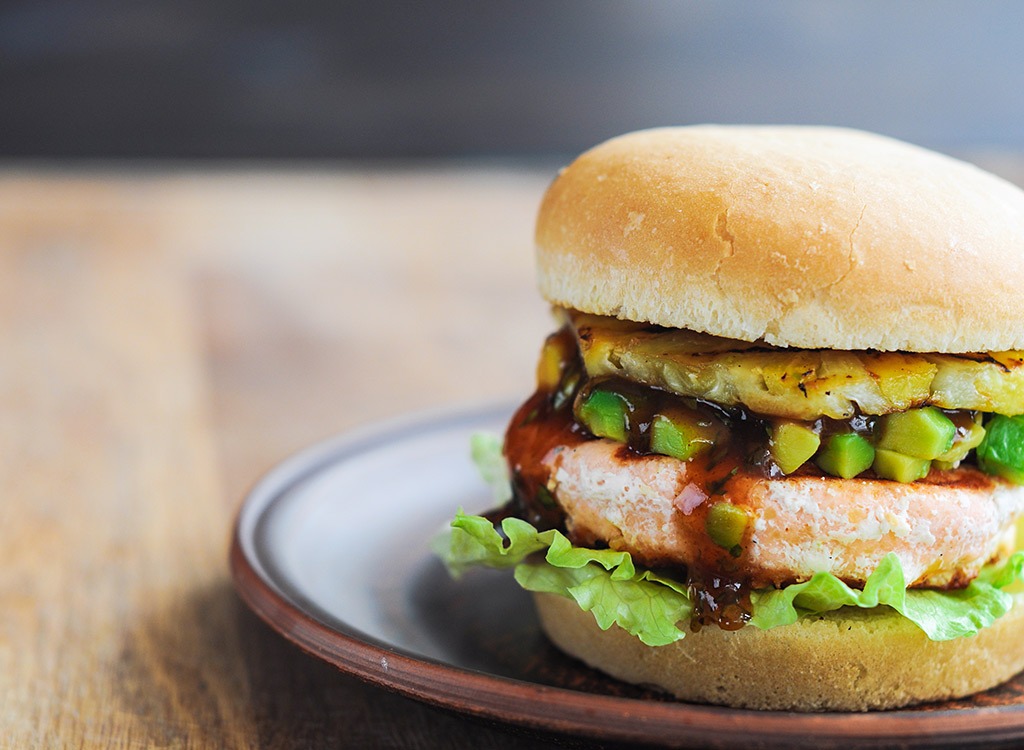
A salmon burger could be just what your doctor orders. More specifically, what your cardiologist orders. That's because, when it comes to proteins, wild salmon is an MVP: It's rich in omega-3's, the healthy fatty acids you find in fish oils that can help lower your risk for heart disease and that fend off metabolism-slowing inflammation. In fact, the American Heart Association recommends we eat cold water fatty fish twice a week, but many people fall short of this goal, says Tieraona Low Dog, chief medical officer of Well & Being and director for the first Interprofessional Fellowship in Integrative Health and Medicine. Just make sure it's always wild salmon; there are at least 8 Shocking Facts About Farmed Salmon that will creep you out.
A cautionary tip courtesy of Low Dog: If you're buying pre-made salmon patties, read the labels carefully to make sure you're not getting fillers or dyes. This burger option can be complemented with healthy garnishes, too, like a yogurt dill sauce. Yum!
Black Bean Burgers
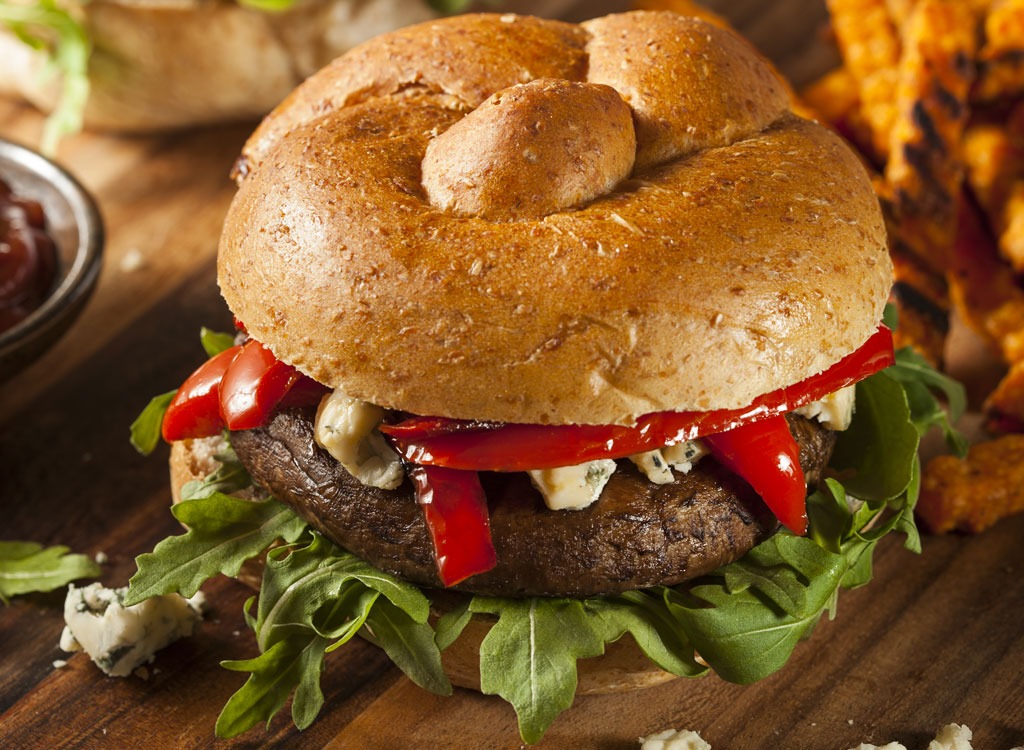
Now for your #1 pick!
We're separating out this subcategory of veggie burgers because black bean burgers are just that worthy of nutritional praise. From a healthy eating standpoint, they've got everything you'd want in a burger: Black beans pack 8 grams of protein and 7.5 grams of fiber in a 1/2-cup serving, but they're low in calories and free of saturated fat.
And don't let their all-black exterior fool you, either. Even though they're not as colorful as traditionally antioxidant-rich fruits, they're still full of them. Black beans are a great source of anthocyanins, which are antioxidant compounds that can boost your brain power. Plus, a study published in the Journal of Agricultural and Food Chemistry found black beans, gram for gram, have more antioxidant activity than other beans. (Those antioxidants are great for destroying free radicals, which are linked to cancer, heart disease, and aging.)
Black bean burgers are almost perfect. But like other garden variety veggie burgers, be sure they're not high in sodium or artificial ingredients and feel free to ask the restaurant you're ordering from how they're made. And for more ways to tap into the powers of this pulse, check out these 25 Recipes and Ideas for Pulses!
